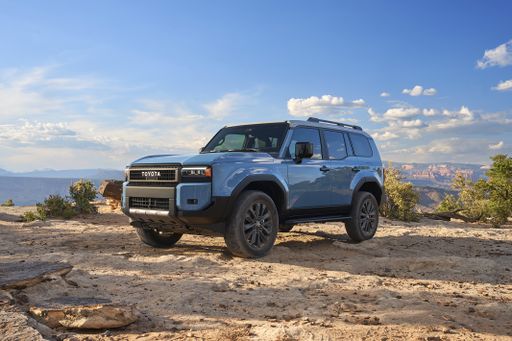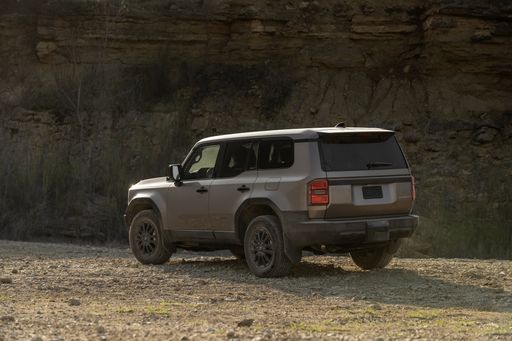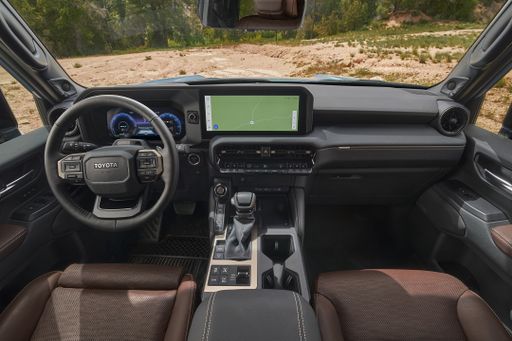Mercedes Sprinter Transporter vs Toyota Land Cruiser - Differences and prices compared
Compare performance (204 HP vs 205 HP), boot space and price (26900 £ vs 70700 £ ) at a glance. Find out which car is the better choice for you – Mercedes Sprinter Transporter or Toyota Land Cruiser?
Costs and Efficiency:
Price and efficiency are often the first things buyers look at. Here it becomes clear which model has the long-term edge – whether at the pump, the plug, or in purchase price.
Mercedes Sprinter Transporter has a clearly advantage in terms of price – it starts at 26900 £ , while the Toyota Land Cruiser costs 70700 £ . That’s a price difference of around 43757 £.
Fuel consumption also shows a difference: Mercedes Sprinter Transporter manages with 7.90 L and is therefore evident more efficient than the Toyota Land Cruiser with 10.60 L. The difference is about 2.70 L per 100 km.
Engine and Performance:
Power, torque and acceleration say a lot about how a car feels on the road. This is where you see which model delivers more driving dynamics.
When it comes to engine power, the Toyota Land Cruiser has a minimal edge – offering 205 HP compared to 204 HP. That’s roughly 1 HP more horsepower.
In terms of top speed, the Toyota Land Cruiser performs decisively better – reaching 170 km/h, while the Mercedes Sprinter Transporter tops out at 90 km/h. The difference is around 80 km/h.
There’s also a difference in torque: Toyota Land Cruiser pulls slight stronger with 500 Nm compared to 450 Nm. That’s about 50 Nm difference.
Space and Everyday Use:
Whether family car or daily driver – which one offers more room, flexibility and comfort?
Seats: Toyota Land Cruiser offers significantly more seating capacity – 7 vs 3.
In curb weight, Mercedes Sprinter Transporter is clearly perceptible lighter – 2052 kg compared to 2610 kg. The difference is around 558 kg.
In maximum load capacity, the Mercedes Sprinter Transporter performs clearly better – up to 15500 L, which is about 13605 L more than the Toyota Land Cruiser.
When it comes to payload, Mercedes Sprinter Transporter clearly takes the win – 2641 kg compared to 540 kg. That’s a difference of about 2101 kg.
Who wins the race in the data check?
The Mercedes Sprinter Transporter holds a decisive overall lead in the objective data comparison.
This result only shows which model scores more points on paper – not which of the two cars feels right for you.
Costs and Consumption
View detailed analysis
Engine and Performance
View detailed analysis
Dimensions and Body
View detailed analysis

Mercedes Sprinter Transporter
Mercedes Sprinter Transporter
The Mercedes Sprinter is the dependable workhorse that makes light of heavy loads, blending smart practicality with a surprisingly carlike cabin that keeps drivers sane on long runs. With a range of configurations and a reputation for durability, it’s the van buyers turn to when they need something tough, clever and oddly enjoyable to drive.
detailsToyota Land Cruiser
The Toyota Land Cruiser is the kind of SUV that makes you feel ready to abandon the map and take the long way home, with legendary go-anywhere capability wrapped in reassuringly solid build quality. Inside it's surprisingly comfortable and grown-up — a practical luxury for buyers who want reliability and presence rather than fleeting flash.
details


Costs and Consumption |
|
|---|---|
|
Price
26900 - 72900 £
|
Price
70700 - 79300 £
|
|
Consumption L/100km
7.9 - 12.7 L
|
Consumption L/100km
10.6 - 10.8 L
|
|
Consumption kWh/100km
27.1 - 31.5 kWh
|
Consumption kWh/100km
-
|
|
Electric Range
194 - 444 km
|
Electric Range
-
|
|
Battery Capacity
56 - 113 kWh
|
Battery Capacity
-
|
|
co2
0 - 333 g/km
|
co2
278 - 284 g/km
|
|
Fuel tank capacity
71 L
|
Fuel tank capacity
80 L
|
Dimensions and Body |
|
|---|---|
|
Body Type
Cargo Van
|
Body Type
Off-Roader
|
|
Seats
3
|
Seats
5 - 7
|
|
Doors
4
|
Doors
5
|
|
Curb weight
2052 - 3166 kg
|
Curb weight
2610 kg
|
|
Trunk capacity
-
|
Trunk capacity
143 - 742 L
|
|
Length
5932 - 7367 mm
|
Length
4925 mm
|
|
Width
1993 mm
|
Width
1980 mm
|
|
Height
2331 - 2663 mm
|
Height
1935 mm
|
|
Max trunk capacity
9000 - 15500 L
|
Max trunk capacity
1829 - 1895 L
|
|
Payload
577 - 2641 kg
|
Payload
540 kg
|
Engine and Performance |
|
|---|---|
|
Engine Type
Electric, Diesel
|
Engine Type
Diesel
|
|
Transmission
Automatic, Manuel
|
Transmission
Automatic
|
|
Transmission Detail
Reduction Gearbox, Manual Gearbox, Automatic Gearbox
|
Transmission Detail
Automatic Gearbox
|
|
Drive Type
Rear-Wheel Drive, All-Wheel Drive
|
Drive Type
All-Wheel Drive
|
|
Power HP
114 - 204 HP
|
Power HP
205 HP
|
|
Acceleration 0-100km/h
-
|
Acceleration 0-100km/h
12.30 s
|
|
Max Speed
90 km/h
|
Max Speed
170 km/h
|
|
Torque
300 - 450 Nm
|
Torque
500 Nm
|
|
Number of Cylinders
4
|
Number of Cylinders
4
|
|
Power kW
84 - 150 kW
|
Power kW
151 kW
|
|
Engine capacity
1950 cm3
|
Engine capacity
2755 cm3
|
General |
|
|---|---|
|
Model Year
2024 - 2025
|
Model Year
2025
|
|
CO2 Efficiency Class
A, G
|
CO2 Efficiency Class
G
|
|
Brand
Mercedes-Benz
|
Brand
Toyota
|
What drivetrain options does the Mercedes Sprinter Transporter have?
The Mercedes Sprinter Transporter is available as Rear-Wheel Drive or All-Wheel Drive.
